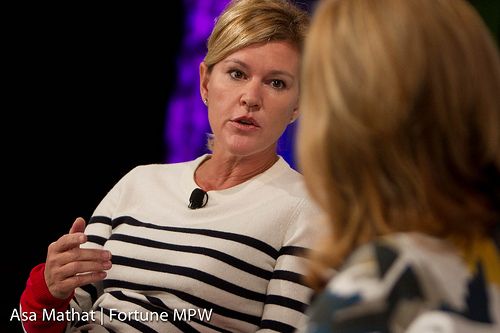Meredith Whitney’s new book, Fate of the States: The New Geography of American Prosperity, is big on predictions. To get into the spirit, I will make one, too: Whitney, a financial analyst and frequent cable news guest, is going to run for office. Her book reads like someone trying to convince political powerbrokers that she’s got the chops to stand up in debates, and it goes much more for quotability than readability.
In its 200 double-spaced pages, there’s not a lot here that you haven’t heard before. And you’ll hear it many more times, because Whitney believes in the power of repeating your points. Again and again and again and again. Her one original idea is that, in the coming years, the formerly less prosperous states of the Midwest will drive national growth. Basically, the geographic band from Texas and Louisiana up to Wisconsin and North Dakota represents the future.
Her reasoning for this comes down to money. States in the Texas-to-Wisconsin strip have lower tax rates, less personal debt and written laws such that workers are sure to negotiate with a weak hand. Whitney casts what looks like a race to the bottom from places in high demand as a forward-thinking race to the bottom. It reminds me of the part in The Economy of Cities where Jane Jacobs writes of “Specious ‘Causes’ of Cities Growth.” Jacobs points out that no less a light than Alexander Hamilton predicted that Jersey City would quickly outpace New York City’s growth, thanks to what he believed to be its more advantageous location. We’re coming up on 200 years, and Jersey City hasn’t come anywhere close.
I certainly hope that there is a lot of growth in America’s middle and wish it the best. After all, I grew up in Kansas. Most people I grew up with are still there, and I would be very happy to see them blessed with more opportunities. But are the middle states really going to be the economic powerhouses of the future? Will the next Tesla Motors sprout up in Topeka?
When someone is pitching you on an idea, especially in the policy world, here’s a red flag: Lots and lots percentages. Folks love to point to percentages to make a case when the case is weak. Percentages (or rates of change) are great for spin, because they give the appearance of absolute valuation when, in fact, their relativity is pitiful when you get down to real numbers.
For example, in one chapter Whitney attempts to argue that growth is robust in her favored states while it has been hobbled by shortsighted policy in economic deadweights such as New York and California. The growth rates she gives are for Louisiana (16 percent), North Dakota (27 percent) and Iowa and Nebraska (11 percent for both).
It sounds attractive. A young person might like a shot at a piece of a 10-plus percent growth rate, right?
Hold on. Does a worker want a part of a percentage or a part of actual money? Because these numbers look a bit different. Let’s turn those rates-of-growth into real dollar values, using data from the U.S. Commerce’ Department’s Bureau of Economic Analysis. California’s growth was very bad in that time, no question. North Dakota, Iowa and Nebraska each made some nice money, ranging from $8 billion to $12 billion. Louisiana did better, at about $23 billion in growth. None made as good a showing as New York, however, which clocked in at $89 billion in growth, from the height of the recession to deep into the recovery.
Percentage wise? Kind of weak. But $89 billion is $89 billion. I’ll take 0.000001 percent of that. And while California looks very bad over the years chosen, what Whitney doesn’t tell you is that it more than made up for lost time between 2011 and 2012, adding a startling $100 billion to its economy, so says the Commerce Department.
That said, Whitney is right that in every case — the growth rates of her anointed states are much better. But the growth itself? It’s not even close. In fact, if you add the economies of Louisiana, Nebraska, Iowa and North Dakota together, they come many billions of dollars short of equaling one New York State, nor even the New York City metropolitan area.
Why is it that places like New York, California and Illinois are such powerhouses? A lot of ink has been spilled on that. Of course, here at Next City we tend to favor the idea that it’s because they can lay claim to the nation’s most successful and enduring cities. Just what makes New York and Los Angeles so special is anyone’s guess. It’s probably a confluence of far too many virtues to explain simply, but I’m sure it’s not something so dull as balance sheets. States can keep eviscerating their tax bases in hopes of luring business, and some will, in fact, come. I have no doubt that Google will keep putting server farms in out-of-the-way places, which is a good thing. Massive companies like Google should spread it around.
But let me know when Apple moves its design team to Oklahoma.

There’s a lot in Whitney’s book that anyone should agree with: Governments need to stop spending beyond their means, politicians need to stop raiding pension and healthcare accounts to cover short-term costs, and regulators never should have let bankers use derivatives to fuel the housing bubble. All true. Does that mean that we’re going to see a gigantic demographic shift from the states that played the housing bubble and lost? I don’t think so.
Whitney asks again and again how states so saddled with heavy personal debt can possibly come out on the other side of this latest crisis. Maybe it’s by doing something Americans have been uniquely good at for 100 years: Inventing products that become essential for everyone in the world to own and use (see: Hollywood, Silicon Valley, Madison Avenue).
The only state on this list where the growth is easy to explain is North Dakota — whose path, Whitney argues, California ought to follow. Fortunately, Californians have heard of the natural resource curse. Put another way, maybe the home of Facebook and Sony Pictures should put in a phone call to West Virginia and ask about the kind of shape in which coal mining has left its economy before the Golden State rushes to frack up the San Andreas Fault.
But Whitney writes about more than her projected demographic shift, and that’s why I think Fate of the States is more a future politician’s fundraising treatise than a serious policy document. The first sign of the former comes when Whitney kicks it off with some folksy wisdom from her grandfather, who told her, “you can’t make money if you owe money.”
Yeah, you can. And as a veteran of Wall Street, Whitney knows it. You can actually make a lot more money if you owe money. Businesses confident that they are making a good investment can leverage aggressively. Amazon didn’t make a profit for six years, and Jeff Bezos didn’t cover that out of his personal bank account. He leveraged it. True, you can also lose a lot more money when you’re in debt, as the whole world learned during the Great Recession. But that still doesn’t mean you can’t make money if you owe money. If that were true, we’d have to stop giving student loans, for one. Never trust a book that prints a false aphorism in its intro because it has folksy appeal.
Whitney’s moral math is doesn’t hold up, either. Throughout the book, she harps on pensioners. She’s furious about the fact that shortsighted politicians gave public workers deals too generous for their municipalities to afford. And they did, but this is a world that works best when people and groups of people take responsibility for their mistakes. She never comes right out and says it, but Whitney seems to argue that cities and states should start breaking their contract with those workers and shorting them on their negotiated retirement benefits.
She writes:
There’s no right or wrong in all of this. A government worker rightly feels entitled to the pension and benefits he or she was promised. A taxpayer feels entitled to the essential social services like quality education, safe streets, clean water and all the other things his tax dollars are supposed to support. The bondholder certainly believes he has the right to be paid back principal and interest in exchange for the municipality’s borrowing his investment dollars. It almost doesn’t matter whose claim is the most worthy.
Yet there is a right and wrong here because someone, somewhere, got a free ride. Why is it that the community is having trouble paying its obligation to the pensioner and the bondholder? Because the taxpayer wanted to keep government spending where it was, even though its cost outpaced growth in the tax base. So, accommodating politicians took money due to future pension and bond obligations in order to pay for services in the past.
In other words, taxpayers got an unfair discount — a free ride — and now Whitney is arguing that the taxpayer should still get the same level of service, again, without paying overdue tax increases, at the expense of bondholders and pensioners.
Committing to pensions, now, is a bit silly in a changing world. I can get behind pension reform for current workers. Government should follow business’s lead and help workers set up their own retirement funds and make contributions into them, going forward. But it’s not right to make retired workers receive less than their negotiated retirement package now because taxpayers in the past wanted a discount on the cost of their government.
Skimping on pensions now holds past voters harmless for previous overspending. How fiscally responsible is that? It’s not right and it isn’t even smart, because retirees consume all of their income. They put those funds directly into the economy. If you keep tax rates unsustainably low by robbing pensioners, odds are cities and states just pad the savings accounts of the wealthy.
Still, it’s a rationale that taxpayers (read: potential voters) like. You know who else likes it? Business leaders who pay for political campaigns.

Whitney in 2011. Credit: Fortune Live Media
Fate of the States reads as a long argument for gutting worker protections and state budgets as a way to attract business. Like everyone with this agenda, Whitney cites business leaders who say that regions with lower tax burdens and lax regulatory environments are more attractive. Business leaders should never be quoted on this question. Any businessperson will tell you, candidly, that he or she is happy to take free money if you want to give it. Convincing a politician to hack taxes is the easiest way to get some free money.
Play it out: A CEO tells a reporter that lower taxes would make the company likely to move its corporate HQ, offering political cover for state leaders to give the company some free money. Free money never hurts.
And telling the truth — that businesses have much more important matters than tax rates to consider when locating operations — gives political cover to increase the company’s overhead. To avoid this increased cost, all the CEO has to do is not tell the truth. So of course you’ll have a hard time finding a business leader who will say tax rates don’t matter, even if they don’t.
To back it up, look at the numbers: Whitney cites ChiefExecutive.net’s rankings of best and worst states to do business. For 2013, the site said the very best are Texas, Florida and North Carolina, whereas the worst are California, New York and Illinois. Interesting, because if you pool the economic output of the top three states for business and throw in the fourth, Tennessee, just for fun, you still come a trillion dollars short of the combined economies of the “worst” three states.
The “worst” states beat the “best” by a trillion dollars. If Chicago, New York and San Francisco are so awful and place doesn’t matter and capital is simply effervescent now and all you need is “an internet connection and an airport” (Whitney’s words), then why don’t all those actual CEOs up and leave already?
There must be something going on in those places more profound and more important than balance sheets. Scott Walker can hang all the highway signs he wants saying that “Wisconsin is open for business,” but when he’s long gone Wisconsin will still be home of the cheesehead. Chicago, meanwhile, will still be the city that built the Sears Tower.
In fact, Meredith Whitney has already voted with her feet. She waxes nostalgic of growing up in New Jersey and all the fond memories she has of the place, then writes, “But is living in New Jersey today, with significantly worse infrastructure and public services, worth five times the national average cost of living? Certainly not for me — I don’t live in New Jersey.”
No, she doesn’t. She lives in New York City.
Brady Dale is a writer and performer living in Brooklyn. He grew up in Kansas, spent three years in Wisconsin, six months in north Florida and has no intention of leaving big cities again. You can find him on Twitter.
Brady Dale is a writer and comedian based in Brooklyn. His reporting on technology appears regularly on Fortune and Technical.ly Brooklyn.
















